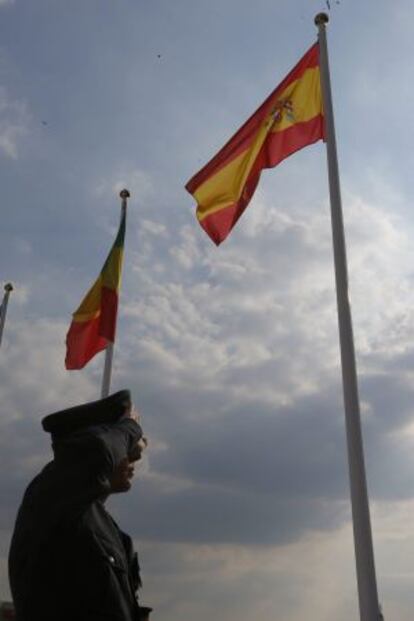Streets paved with gold?
Several studies predict Spain will not improve its record haul of medals from 1992

Before the Spain Olympic team left for Barcelona, only Alejandro Blanco, president of the Spanish Olympic Committee, ventured a guess as to how many medals the country's athletes might bring home. "We will try to ensure that our athletes do what they do every weekend, which should allow us to achieve between 18 and 22 medals."
It was a cautious estimate, based on Spain's return at Beijing (18 medals) and Barcelona in 1992 (22, with 13 golds, a national record). Economists, scientists and consultants were more restrained. Four different mathematical studies, developed using complicated equations by the government's Higher Sports Council (CSD), a bank (Goldman Sachs), a university (Rey Juan Carlos) and a consulting firm (Conento) all agree that Spain will not be among the top 10 countries on the medal table. None forecast a haul of more than 19.
"To match the 18 medals we won in Beijing would be a great result," says Rosa Ortega, deputy director of Elite Competition at the CSD. "In a competition like the Olympics anything can happen, and from a load of medals you can find yourself with a load of Olympic diplomas [awarded to the top eight competitors in each event]. That's why it's risky to guess numbers, because an injury, a fall in a race with obstacles... any uncontrollable factor can change everything."
But the medal count is not built purely on sweat, talent and luck. The economic crisis also affects results. In the past four years, Spanish Olympians and their coaches have received 51 million euros from a funding program set up by the Olympic Sports Association, originally created in 1988 with the Barcelona Olympics in mind. "And although this investment has been maintained," says Ortega, "the CSD budget has decreased, and with it the subsidies. After London, the federations will find it difficult to do anything extraordinary."
"One of the things we have taken into account," says Davide Fabrizio, analytics director at Conento, which predicts 17 medals for Spain, "is that there will be a small drop in results because of the crisis, which is affecting Spain more than other countries."
More money means greater likelihood that an athlete is able to dedicate all their time to training. The greater the investment, the better the infrastructure, the higher the level of coaching. Greater investment, say analysts at Goldman Sachs, brings greater rewards: "When you create a world-class work environment, your chances of creating world-class athletes increase."
As well as the rigors of the recession, Spain's potential medal haul has been compromised by the absence of several members of the Beijing team. Joan Llaneras, who won gold and silver in track cycling in 2008, retired after those Games. Road cyclist Samuel Sánchez and Rafael Nadal, both gold medalists in China, are injured. Sailors Fernando Echavarri y Antón Paz, gold in the Tornado category, will not defend their title. Virginia Ruano, silver medalist in doubles in 2004 and 2008, has retired, as have two other surefire medal bets, Gemma Mengual and Gervasio Deferr.
Spain will look to its traditional strengths (sailing, tennis, canoeing); team sports (soccer, basketball, hockey, synchronized swimming and shooting); individual specialists (Mireia Belmonte in the pool, kayaker David Cal, 1,500m runner Natalia Rodríguez and Francisco Javier Gómez Noya in the triathlon). There may also be a surprise or two: "Lydia Valentín in weightlifting, Maider Unda in wrestling and, maybe, Carolina Marín in badminton," says Ortega.
The Rey Juan Carlos University study predicts that of the 948 medals to be distributed among 39 disciplines, Spain will win 15 in 10 different sports. Thus Barcelona will likely remain Spain's golden Games. It is a question of statistics, says Goldman Sachs, which predicts 19 medals for Spain: every country to have hosted the Games has experienced a 54-percent increase in its medal count.
Tu suscripción se está usando en otro dispositivo
¿Quieres añadir otro usuario a tu suscripción?
Si continúas leyendo en este dispositivo, no se podrá leer en el otro.
FlechaTu suscripción se está usando en otro dispositivo y solo puedes acceder a EL PAÍS desde un dispositivo a la vez.
Si quieres compartir tu cuenta, cambia tu suscripción a la modalidad Premium, así podrás añadir otro usuario. Cada uno accederá con su propia cuenta de email, lo que os permitirá personalizar vuestra experiencia en EL PAÍS.
¿Tienes una suscripción de empresa? Accede aquí para contratar más cuentas.
En el caso de no saber quién está usando tu cuenta, te recomendamos cambiar tu contraseña aquí.
Si decides continuar compartiendo tu cuenta, este mensaje se mostrará en tu dispositivo y en el de la otra persona que está usando tu cuenta de forma indefinida, afectando a tu experiencia de lectura. Puedes consultar aquí los términos y condiciones de la suscripción digital.









































